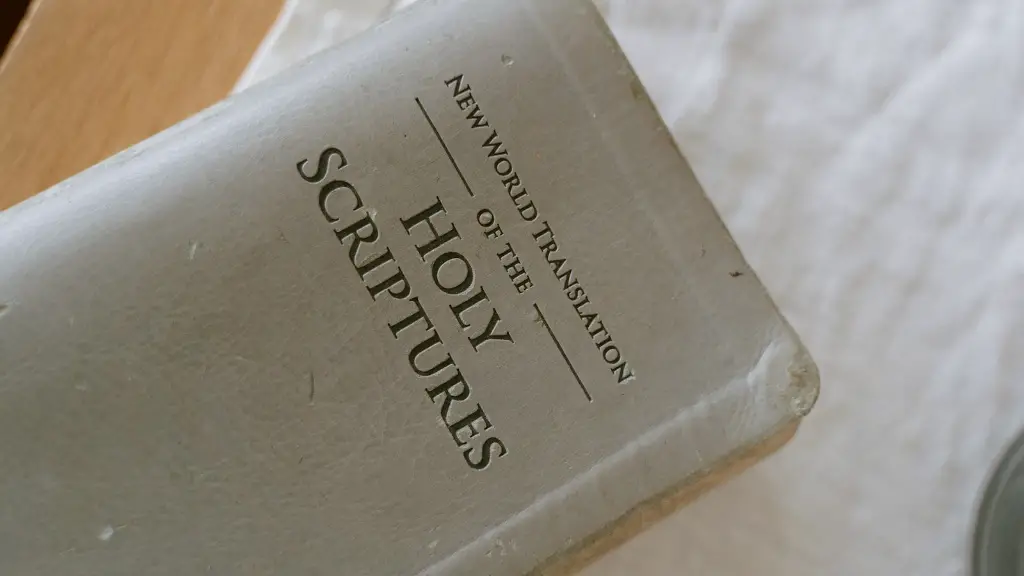The conversation about homosexuality and the Bible is a complex one. For many religious adherents, the two are inseparably intertwined. Homosexuality is addressed in several verses in both the Old and New Testaments, but there is debate about their interpretation and application. The Bible refers to same-sex activity several times but does not explicitly speak to homosexuality directly as it is widely understood today.
By some interpretations, seven of the biblical passages traditionally used to refer to same-sex relationships are interpreted to refer to same-sex sexual activity as a sin. These include Leviticus 20:13, Romans 1:26-27, I Corinthians 6:9-10, and I Timothy 1:10. Two passages in particular – Genesis 19:5-7 and Judges 19:22-25 – are argued to discuss attempted same-sex rape rather than consensual homosexual behavior.
At the same time, it is also important to note that many people from a variety of faith traditions, including many Christian denominations, recognize that same-sex relationships can be loving, committed, and holy unions. These believers point to passages in other denominations about God’s love for all people, no matter their sexual orientation or gender identity. For instance, believers often cite passages like Galatians 3: 28-29, which states: “There is no longer Jew or Greek, slave or free, male or female; for all of you are one in Christ Jesus.”
The discussion about the Bible’s passages on homosexuality has been going on for many years and is likely to continue as interpretations of the texts evolve with changing beliefs, values, and societal norms. Many experts suggest that a good starting point is to acknowledge that differing beliefs exist and that any discussion should be approached with an open mind and respect for the beliefs of all parties involved. In other words, when talking about the Bible and homosexuality, an open, honest dialogue is key.
Critics have argued that some of the passages in the historical context refer to persons engaging in same-sex activities in a manner that would be generally considered immoral today. For example, in Romans 1: 26-27, homosexual men are condemned for engaging in temple prostitution, a custom outside of today’s societal norms. This is in contrast to modern Christians who embrace loving, committed same-sex relationships that do not involve prostitution.
When it comes to interpreting the Bible’s passages on homosexuality, different people may come to different conclusions. Ultimately, everyone should be entitled to make their own interpretations and come to their own conclusions. It is therefore important that discussions about religion and homosexuality be approached with humility and respect, in order to ensure a fruitful exchange of ideas.
Modern Context
In today’s society, same-sex relationships have gained much wider acceptance than they had in the past. This is in part due to the recognition of the struggles of marginalized and oppressed groups, including members of the LGBTQ+ community, who have fought for their rights and turned the narrative on its head. This shift towards more tolerant attitudes has led to a broader dialogue and acceptance of same-sex relationships, particularly within religious denominations. Many Christian churches, for example, now recognize same-sex unions, something that would have been unthinkable even a few decades ago.
The recent advances in understanding and accepting LGBTQ+ relationships has also sparked a debate about how to interpret scripture and what it means for modern church teaching. As understanding and acceptance of same-sex relationships has grown, some Christian denominations have begun to look at scripture in new ways, suggesting that there is room to reinterpret certain passages and acknowledge that same-sex relationships can be holy and meaningful.
Regardless of what one’s religious beliefs may be, it is important to remember that there is room for respectful dialogue and understanding of differing perspectives. The subject of homosexuality and the Bible can be fraught and complex, but with an open mind and an honest approach, fruitful conversations are possible, and even beneficial.
Pastoral Care
Within the church today, pastoral care often finds its way into conversations about homosexuality and the Bible. Pastoral care involves providing love, acceptance, and understanding to people of all backgrounds and persuasions, including members of the LGBTQ+ community. This means providing pastoral care not just for members of the same faith, but for everyone, no matter their background or beliefs.
One of the primary responsibilities of those who work in pastoral care is to provide a safe space to explore matters of faith and sexuality in an open, non-judgmental setting. In this context, it is important to remember that, while they may have different views on the Bible and homosexuality, pastoral care providers should be open to engaging and listening to all points of view. This could involve attending workshops and conferences, reading books, or attending talks and seminars related to the subject.
Pastoral care providers should also strive to provide education and information to those who seek it. This could include attending seminars with respected faith leaders who are specifically focused on providing an understanding of LGBTQ+ issues in relation to the Bible. It could also involve attending workshops or classes on LGBTQ+ sensitivity and how religious teaching may be interpreted differently in the current era.
Most importantly, pastoral care providers should be a source of support for those in need. This could involve offering resources and referring people to appropriate agencies or organizations, as well as making personal connections with those who wish to explore their faith and sexuality in a safe, non-judgmental environment.
Intersections of Faith and Sexuality
At the intersection of faith and sexuality, there are often challenges and questions that may not have clear answers. How can LGBTQ+ individuals reconcile their faith and sexuality when there appear to be conflicting messages? How can existing religious teachings on homosexuality be understood in the context of today’s society? What do religious scriptures say about same-sex relationships? These are complex questions, and it is important to approach them with an open mind, listening to all perspectives before forming an opinion.
A good place to start is to seek out and learn from LGBTQ+ people who have struggled to reconcile their faith and sexuality. This can provide a valuable perspective on how to make sense of it all. Similarly, learning from those who are in same-sex relationships and have chosen to remain faith-based can be useful. It is also worth noting that some religious denominations, such as the Episcopal Church, the United Church of Christ, and Reform Judaism, are now affirming of LGBTQ+ relationships, providing further insight into modern perspectives on religion and sexuality.
Ultimately, understanding how religious scriptures may interact with an individual’s identity and sexuality is something that each person must decide for themselves. Every individual’s journey is unique, and it is important to provide the space, support, and understanding for those who are struggling to reconcile their faith and sexuality.
Social Implications
When considering the implications of faith, sexuality, and the Bible, it is worth noting that society has also changed significantly in recent years. In many countries, laws and attitudes have shifted more towards tolerance, acceptance, and LGBTQ+ equality. This has prompted many to ask: Is it possible to be faithful to one’s beliefs while being open and accepting of others, regardless of sexual orientation or gender identity? And if so, should religious institutions show the same level of acceptance towards LGBTQ+ individuals?
On a wider level, the discussion about homosexuality and the Bible has larger implications in society. Acceptance of same-sex relationships can help to reduce and even reverse discrimination, stigma, and intolerance, which can lead to better health outcomes for members of the LGBTQ+ community. Similarly, education and discussion about the complexities of faith and sexuality can help to bridge divides and foster understanding between people of different backgrounds and faiths.
The conversation about homosexuality and religion is ongoing, and it is important to approach it with respect and open-mindedness. Once entrenched societal attitudes and beliefs can take time to shift, but it is encouraging to see that many have embraced the challenges posed by these sensitive issues and are working towards finding common ground to move forward.
Diversity and Inclusion
At the end of the day, the differing opinions on faith and sexuality can be reconciled by respecting personal beliefs and embracing diversity and inclusion. This means creating an environment where everyone can express their beliefs and views without judgment or criticism. Respectful dialogue is key when it comes to matters of faith and sexuality, and it is important to remember that everyone’s story is unique.
The church can play an important role in fostering respect and understanding, particularly through ministry and pastoral care. In this context, it is important that the church provide a safe, non-judgmental space for discussion, where everyone’s backgrounds and beliefs are respected and accepted. This could include providing education and resources on matters of faith and sexuality, as well as addressing any misunderstandings or misconceptions that may exist.
Given the complexities of faith and sexuality, the discussion about homosexuality and the Bible will continue to be an ongoing one. Ultimately, it is important to remember that religious beliefs should be respected and that everyone should be entitled to make their own interpretations. Thoughtful dialogue and understanding of differing perspectives is essential for providing a safe environment for everyone to express their beliefs and views.





